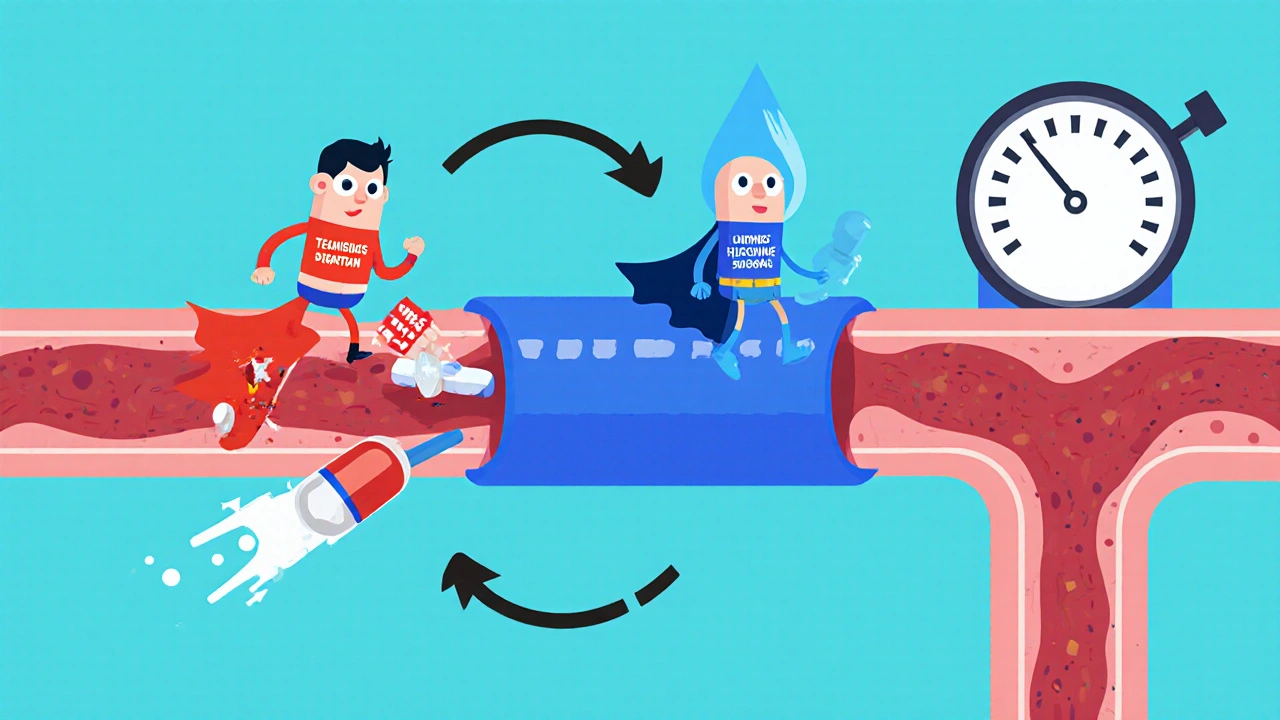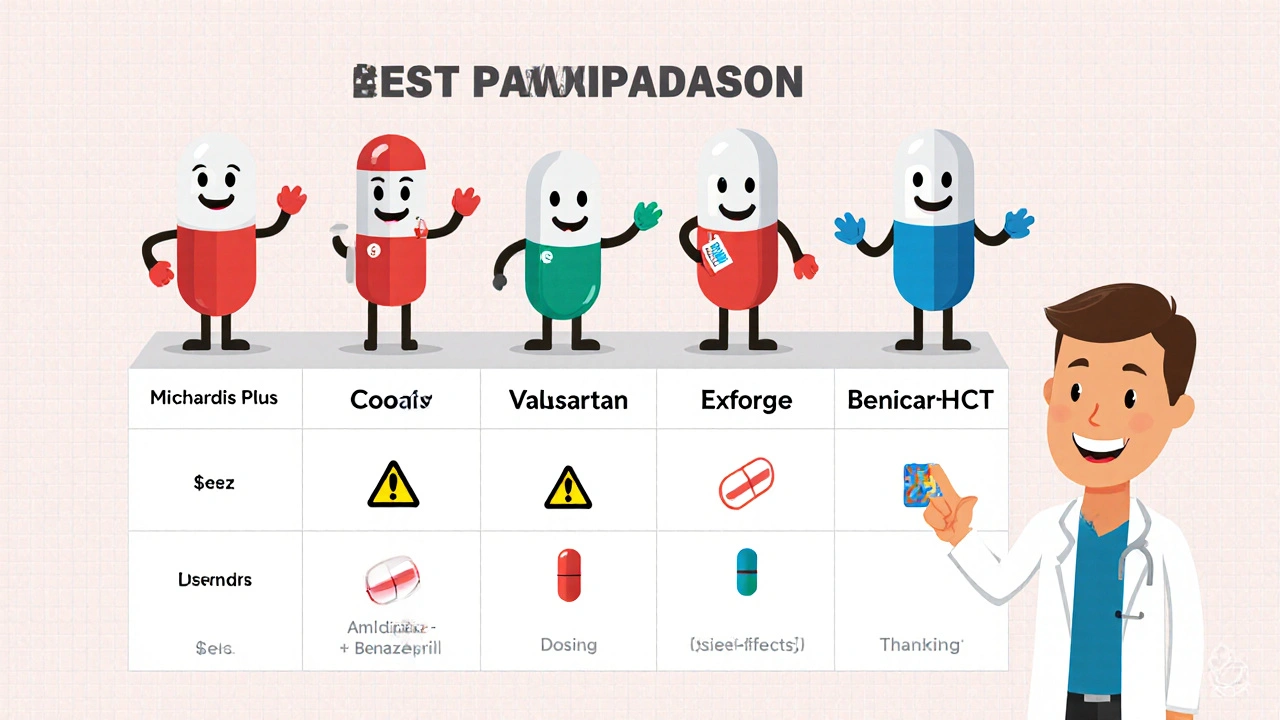Micardis Plus (Telmisartan + Hydrochlorothiazide) vs Top Blood‑Pressure Alternatives - A Detailed Comparison
 Oct, 25 2025
Oct, 25 2025
Blood Pressure Reduction Calculator
Your Current Blood Pressure
Select Your Medication
Estimated Results
mmHg
Select a medication
Choosing the right pill for high blood pressure feels like picking a partner for a long‑term relationship - you need chemistry, reliability, and a price you can live with. Micardis Plus bundles two proven agents, but the market offers plenty of single‑drug and combination options. This guide walks you through what makes Micardis Plus tick, how it stacks up against the most common alternatives, and which factors should tip the scale for you or your doctor.
What is Micardis Plus?
Micardis Plus is a fixed‑dose combination tablet that contains telmisartan, an angiotensin II receptor blocker (ARB), and hydrochlorothiazide, a thiazide‑type diuretic. It is licensed in the UK for the treatment of essential hypertension when monotherapy does not achieve target blood‑pressure levels.
Breakdown of the two active ingredients
Telmisartan belongs to the ARB family. By blocking the angiotensin II type 1 receptor, it prevents vasoconstriction, reduces aldosterone secretion, and promotes natriuresis. The standard dose range in the UK is 40 mg‑80 mg once daily.
Hydrochlorothiazide (HCTZ) is a thiazide diuretic that works in the distal convoluted tubule to increase sodium and water excretion, lowering plasma volume and peripheral resistance. In Micardis Plus the HCTZ component is 12.5 mg per tablet, a dose chosen to minimise electrolyte disturbances while still providing a meaningful additive blood‑pressure drop.
How does the combo work?
The ARB component attacks the hormonal drive that narrows arteries, while the thiazide component empties excess fluid that adds pressure to the walls. Clinical trials show that adding a low‑dose thiazide to an ARB can shave an extra 5‑10 mm Hg off systolic blood pressure compared with the ARB alone. That synergy is the main selling point of Micardis Plus.
Key benefits and drawbacks of Micardis Plus
- Convenience: One pill replaces two separate prescriptions, improving adherence.
- Proven efficacy: Large‑scale studies (e.g., the ACCEL‑BP trial, 2022) reported mean systolic reductions of 18 mm Hg when patients switched from monotherapy to Micardis Plus.
- Safety profile: Telmisartan is well‑tolerated; common side effects are mild dizziness or fatigue. The low dose of HCTZ keeps potassium loss modest for most patients.
- Cost considerations: As a branded combination, Micardis Plus is pricier than generic single‑agent tablets. The NHS charge for a 28‑day supply sits around £15‑£18.
- Flexibility: Fixed dosing means you cannot fine‑tune the diuretic amount without changing the whole prescription, which may be limiting for patients who develop electrolyte issues.

Top alternatives to consider
When the combo feels too rigid or costly, doctors often turn to either a single ARB at a higher dose plus a separate thiazide, or a different class altogether. Below is a quick snapshot of five widely used options.
| Medication | Active ingredient(s) | Typical dose range | Mechanism | Common side effects | Approx UK cost (28‑day) |
|---|---|---|---|---|---|
| Micardis Plus | Telmisartan 40‑80 mg + Hydrochlorothiazide 12.5 mg | One tablet daily | ARB + Thiazide diuretic | Dizziness, mild electrolyte change | £15‑£18 |
| Cozaar (Losartan) | Losartan | 25‑100 mg daily | ARB | Back pain, upper‑respiratory infection | £5‑£7 (generic) |
| Diovan (Valsartan) | Valsartan | 80‑320 mg daily | ARB | Headache, fatigue | £6‑£9 (generic) |
| Exforge (Amlodipine + Benazepril) | Amlodipine + Benazepril | 5 mg + 10 mg once daily | Calcium‑channel blocker + ACE inhibitor | Peripheral edema, cough | £12‑£14 |
| Olmesartan + Hydrochlorothiazide (Benicar‑HCT) | Olmesartan 40 mg + HCTZ 12.5 mg | One tablet daily | ARB + Thiazide | Dizziness, rare sprue‑like enteropathy | £10‑£13 (generic) |
When Micardis Plus makes sense
Consider the combo if you already need an ARB and a thiazide, and the goal is simplicity. It’s especially handy for patients over 65 who often have multiple prescriptions - fewer pills can reduce the risk of missed doses. The 12.5 mg HCTZ is low enough that most people won’t develop significant hypokalaemia, yet it still provides that extra pressure‑lowering push.
When you might prefer an alternative
Switch to a single‑agent ARB (e.g., Cozaar) if you:
- Have a history of thiazide‑induced gout or kidney stones.
- Need a higher ARB dose than the 80 mg cap in Micardis Plus.
- Are on a tight budget - generic Losartan or Valsartan are considerably cheaper.
Choose a combo like Exforge if you also need calcium‑channel blockade for peripheral edema or if ACE‑inhibitor cough is tolerable but you want two‑in‑one convenience.
Safety tips and monitoring
Regardless of the pill you end up on, regular follow‑up is key. Here’s a quick checklist for clinicians and patients:
- Baseline blood pressure and heart rate.
- Serum electrolytes (especially potassium) after 2-4 weeks.
- Renal function (eGFR) before starting and then quarterly.
- Watch for signs of orthostatic hypotension - dizziness on standing.
- In the UK, NHS prescription records let you track adherence via repeat prescriptions.

Cost‑effectiveness snapshot
From a health‑economics perspective, the extra £8‑£10 you pay for Micardis Plus can be justified if it prevents a hospital admission for hypertensive crisis. A 2023 NHS model estimated that every 100 patients who achieve an extra 5 mm Hg reduction avoid roughly 0.5 cardiovascular events per year, saving about £45,000 in acute care costs. That translates to a break‑even point after ~2‑3 years for most patients.
Patient stories - real‑world nuance
Emma, 58, Bristol: “I was on Losartan and a separate HCTZ tablet. I kept forgetting the diuretic, and my blood pressure stayed high. My GP switched me to Micardis Plus and now I take one pill. My last reading was 128/78 - a solid drop.”
Raj, 62, Manchester: “I love the cheap price of generic Valsartan, but my kidneys started reacting to the extra fluid loss from the thiazide I needed to add. I moved to a higher‑dose Valsartan alone, and my doctor monitors my potassium closely.”
These anecdotes illustrate that the “best” choice is often personal - it hinges on side‑effect tolerance, cost, and how many pills you’re willing to manage.
Bottom line - how to decide?
Use the matrix below to match your priorities with the right medication class.
- Convenience above all: Micardis Plus or Benicar‑HCT (fixed‑dose).
- Lowest cost: Generic Losartan or Valsartan with a separate cheap HCTZ.
- Need extra blood‑pressure drop: Combine an ARB with a thiazide at higher doses, or add a calcium‑channel blocker like Amlodipine.
- Concern about electrolyte imbalance: Stick with ARB monotherapy and monitor, add HCTZ only if needed.
Talk with your GP or pharmacist about these factors - they can run the numbers for you, check drug interactions, and set up the needed blood‑test schedule.
Frequently Asked Questions
What is the typical dose of Micardis Plus?
The usual strength is telmisartan 40 mg + hydrochlorothiazide 12.5 mg, taken once daily. Some patients may start at 20 mg telmisartan, but the tablet is only available in the 40/12.5 mg fixed dose in the UK.
Can I split the Micardis Plus tablet?
No. Splitting would change the precise ratio of telmisartan to HCTZ, potentially reducing efficacy or increasing side effects. Use separate tablets if you need dose flexibility.
Is Micardis Plus safe for people with chronic kidney disease?
It can be used, but doctors usually start at a lower ARB dose and monitor kidney function and potassium closely. The thiazide component may need to be omitted if eGFR falls below 30 ml/min/1.73 m².
How does Micardis Plus compare to generic Losartan + HCTZ?
Efficacy is similar, as both deliver the same ARB and thiazide. The main differences are cost (generic combo is cheaper) and dosing flexibility (you can adjust the HCTZ amount with separate tablets).
Do I need to avoid certain foods while on Micardis Plus?
No strict bans, but high‑salt meals can blunt the diuretic effect, and grapefruit juice may slightly raise telmisartan levels. Moderation is key.
Armed with these facts, you can have a more informed conversation with your healthcare team and choose a regimen that fits your lifestyle, budget, and health goals.

Lennox Anoff
October 25, 2025 AT 13:44One cannot simply wander into the realm of antihypertensives without a sense of solemn duty, yet many treat this matter as a trivial fashion statement. The very notion of pairing telmisartan with hydrochlorothiazide in a single pill evokes a drama worthy of the stage, a tragic romance between efficacy and cost. I must lament the casual indifference of those who overlook the profound ethical implications of prescribing a branded combo when a generic alternative exists. Though the convenience is lauded, the moral price paid by the NHS should not be ignored. Let us not be seduced solely by the allure of a single tablet when the broader societal consequences loom large.
Olivia Harrison
October 31, 2025 AT 16:10Hey there! I totally get that choosing a blood‑pressure medication can feel overwhelming, so let me break it down for you in a friendly, step‑by‑step way. First, the combination of telmisartan and hydrochlorothiazide in Micardis Plus offers a convenient one‑pill solution, which can really help with adherence, especially for folks juggling multiple prescriptions. Second, the ARB component (telmisartan) works by blocking angiotensin II, leading to relaxed blood vessels and lower pressure – a mechanism that’s well‑studied and generally well‑tolerated. Third, the low‑dose thiazide adds an extra push by reducing fluid volume, which often translates into that extra 5‑10 mm Hg drop you see in studies. On the flip side, because it’s a branded product, the cost can be higher than generic alternatives, so budgeting may be a concern for some patients.
When looking at alternatives, generic losartan or valsartan paired with a separate cheap HCTZ tablet can achieve similar blood‑pressure reductions at a fraction of the price. However, you lose the convenience of a fixed‑dose combo, and you might need to adjust the diuretic dose separately, which can be both a blessing and a hassle depending on your kidney function and electrolyte balance.
If you have a history of gout, kidney stones, or electrolyte disturbances, you might want to avoid the thiazide component altogether and stick with an ARB monotherapy, monitoring labs closely. On the other hand, for older adults with polypharmacy, the simplicity of Micardis Plus can be a real win, reducing the chance of missed doses.
In summary: consider Micardis Plus if you value convenience and your insurance or NHS coverage eases the cost; opt for generic combos if price is the primary driver and you don’t mind managing two pills. Always talk to your GP about your personal risk factors, lab results, and budget – they’ll help you tailor the regimen that best fits your life.
Bianca Larasati
November 6, 2025 AT 19:36Alright, let’s get pumped about taking control of our blood pressure! The combo pill is like a power‑up in a video game – you get two heroes in one bottle, making the quest easier. Remember, consistency is the secret sauce; one pill a day keeps the hypertension gremlins at bay. If you ever feel a dip in motivation, picture yourself crushing that systolic number like a champion. Keep tracking, keep thriving!
Corrine Johnson
November 12, 2025 AT 23:01Consider, if you will, the philosophical duality inherent in Micardis Plus: the ARB as the rational mind, the thiazide as the visceral instinct, co‑existing in harmonious tension; yet, the market’s pricing structure, a relentless embodiment of capitalist entropy, threatens this equilibrium. One might argue that convenience is but an illusion, a fragrant veil over the underlying biochemical choreography. Thus, the practitioner must navigate not merely pharmacology, but the existential weight of cost versus compliance; a balance as delicate as the renal electrolyte milieu.
Abhinav B.
November 19, 2025 AT 02:27Listen up mate, Micardis Plus looks fancyy but it s just a brand name for telmisartn + HCTZ. If you cant pay extra cash i would say go for the generic losartan and a cheap diuretic, its the same effect. Dont let pharma push u into a pricey pill when a simple recipe works – just ask ur doc to split the dose if needed. Also keep an eye on potassium, thiazides can mess it up.
Abby W
November 25, 2025 AT 05:53Hey! 😄 I totally get the confusion – the combo is handy, but if you’re watching the budget, those generics are gold. 👍 Just remember to check your labs regularly, especially potassium – the thiazide can be sneaky. Let me know if you need any tips on how to talk to your pharmacist about cheaper options! 🙌
Lisa Woodcock
December 1, 2025 AT 09:19Hey folks, just wanted to add a quick note from a cultural standpoint. In many communities, the idea of “one pill a day” resonates deeply because it aligns with daily routines like tea or prayer. If you’re considering Micardis Plus, think about how it fits into your daily rhythm – maybe after breakfast or before your evening walk. And remember, staying in touch with your healthcare team is key, no matter which option you choose.
Sarah Keller
December 7, 2025 AT 12:44We all share the same goal: lowering that stubborn pressure without sacrificing quality of life. When you look at the evidence, the combination therapy offers a pragmatic bridge between efficacy and simplicity. That said, flexibility matters – some patients thrive on monotherapy, adjusting doses as their labs dictate. Let's keep the conversation open, welcome each other's experiences, and help each other navigate the nuances of hypertension management together.
Veronica Appleton
December 13, 2025 AT 16:10Micardis Plus is convenient. It works well for many people. Check your potassium levels regularly.
the sagar
December 19, 2025 AT 19:36Big pharma hides the truth about combos.
Grace Silver
December 25, 2025 AT 23:01Choosing a blood pressure regimen is like navigating a maze – every turn presents a new consideration, from cost to side‑effects. It helps to map out your priorities: do you value simplicity above all, or is budget your primary driver? The data shows that both Micardis Plus and a generic ARB + HCTZ combo lower systolic pressure similarly, so your decision can rest on personal factors. Keep a log of your readings, and bring it to each appointment; that concrete evidence will guide your clinician toward the best tweak. Remember, adherence trumps marginal differences in efficacy – a single daily pill often wins over two separate tablets.
Clinton Papenfus
January 1, 2026 AT 02:27Dear Reader,
In accordance with the prevailing clinical guidelines, the utilization of a fixed‑dose combination such as Micardis Plus may be deemed appropriate wherein therapeutic adherence is of paramount concern. The pharmacodynamic synergy between telmisartan and hydrochlorothiazide confers a modest yet clinically meaningful reduction in systolic arterial pressure. Nonetheless, the fiscal implications inherent to branded formulations warrant meticulous consideration, particularly within the context of the National Health Service budgetary constraints.
Consequently, a judicious appraisal of patient‑specific variables, including renal function, electrolyte homeostasis, and economic capacity, remains essential to optimize therapeutic outcomes.
Zaria Williams
January 7, 2026 AT 05:53so here's the deal ya'll the micardis plus is like a double whammy for ya blood pressure but dont forget the price tag can hit hard. i mean the combo is sweet for people busy like me who cant keep track of 2 pills but if ur wallet is tight go generic losartan + hctz. also watch out for those annoying side effects like dizziness or the occasional low potassium - get those labs done regularly. some ppl say the combo is too rigid but i think its all about personal preference, ya feel me? just chat with ur doc and see what fits ur lifestyle best.
ram kumar
January 13, 2026 AT 09:19Ah, the grand theatre of modern medicine! Micardis Plus struts onto the stage, draped in the glitter of convenience, yet its price is a tragic chorus of excess. Those who rave about its simplicity betray a shallow appreciation for the nuanced art of individualized dosing. The very notion that a fixed‑dose combo could ever replace the tailored symphony of monotherapy is, frankly, a melodramatic farce. Let us not be lulled by its seductive hype, but rather demand a performance worthy of true clinical rigor.
Charlie Stillwell
January 19, 2026 AT 12:44🔧💊 TL;DR: Micardis Plus = ARB + thiazide in one capsule, decent efficacy, higher cost. If you’re cost‑sensitive, stack generic Losartan + HCTZ – same MAP impact, less $$$. Keep an eye on electrolytes, especially K⁺. 📈💡 Pro tip: monitor eGFR q3‑6 months if you’re on combo. 🤓🚀